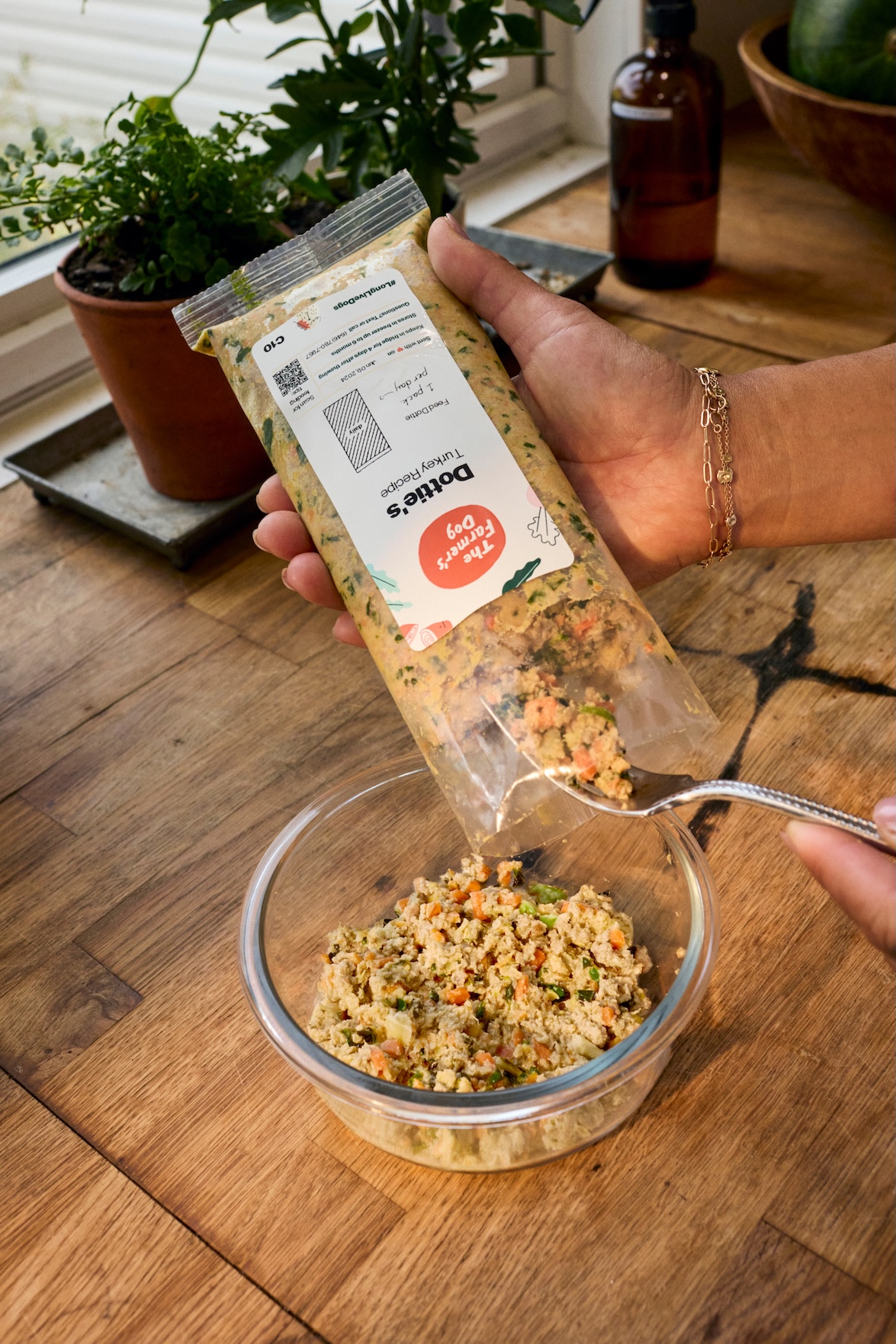In theory, if your dog is eating a nutritionally complete and balanced diet, they don’t need any snacks or treats—they won’t be hungry between meals and they won’t be starved of nutrients. In fact, too many “extras” outside of your dog’s meals can throw off the nutritional balance that those meals provide.
But let’s be real. Snacks are useful for training purposes, and dogs, like everyone else, take pleasure in a good snack. We can’t deny the excitement and happiness a good treat can generate, for us, and for them. Just follow a few guidelines to be sure that snacks aren’t undermining your dog’s good health.
Here, some tips for choosing and feeding treats, and a roundup of simple, fresh snacks that both of you will feel good about.
Weighing the risks and benefits of dog treats
According to the Association for Pet Obesity Prevention (APOP), 56% of dogs in the U.S. are overweight or obese. Excess weight places dogs at increased risk for conditions like heart disease, osteoarthritis, and cancer, making it one of the most pressing health issues they face.
Many commercial dog treats are laden with calories, sugar, and dubious ingredients, and can contribute to obesity (even healthful foods—including fruits and vegetables—given in excess can contribute to weight gain).
In a recent study, study, researchers at the University of Padua analyzed 32 popular dog treats for nutritional content; these included biscuits, tender treats, meat-based strips, rawhides, chew sticks, and dental care sticks. Most of these, they say, exceeded the recommended daily energy allowance for treats.
Do You Know What’s In Your Dog Treats?
The actual ingredients in a dog treat should also match what’s on the label, yet this is often not the case. In the same university study, researchers discovered that 76% of the treats they analyzed contained between four and nine ingredients, and that they weren’t accurately represented on the labels.
This can be especially dangerous for dogs on controlled diets. Take for example, a dog with kidney disease who needs their dietary protein to be restricted. If you can’t trust what’s on the label, how can you be certain that the dog treat doesn’t contain excessive protein?
Processed jerky treats also carry risks—the FDA reported that as of 2015 it had received over 5,000 complaints of illnesses associated with chicken, duck, or sweet potato jerky treats, involving products imported from China.
So what types of treats can my dog eat?
Commercial treats from companies that you trust or homemade treats prepared with the guidance of a board-certified veterinary nutritionist, are of course, two options.
Veterinarians, including those from the World Small Animal Veterinary Association (WSAVA), recommend fruits and vegetables because they’re high in nutrients and low in calories. Here are some choices that, fed in moderation, will do your dog’s body some good.
Apples
An apple a day may not keep the vet away, and that’s probably for the best— vets are really important!—but apples are great, and make a healthy snack for dogs. Apples are relatively high in fiber, which can aid in your dog’s digestion. They’re also a good source of antioxidants (vitamins A and C), which can help protect against free-radical damage. An added benefit: They can help remove residue from teeth to keep your dog’s mouth healthy and their breath fresh.
Caution: Apples contain amygdalin, a form of cyanide that’s poisonous if consumed. So always remove the seeds and core before offering them to your pup.
Bananas
Bananas are low in cholesterol and sodium, relatively high in fiber, and contain potassium, vitamins (including vitamin C), fiber, and copper, which can contribute to a healthier heart, better digestion, and increased energy. Keep in mind that a small banana has 12 grams of sugar, so serve in moderation.
Blueberries
Blueberries are not only rich in antioxidants (vitamins C and K) and high in fiber, but they contain powerhouse phytochemicals, including anthocyanins, which give the berries their color. Share the health next time you’re whipping up a smoothie and toss a few berries into your dog’s bowl. Pro tip: break open blueberries to unleash their scent and make them more interesting to your dog.
Cantaloupe
Filled with beta-carotene, fiber, folate, niacin, potassium, and vitamins A, B-6, and C, this sweet melon is a nutritional powerhouse for your pup. Don’t forget to remove the seeds and rind, as they can both cause stomach and digestive issues.
Carrots
If you’re wondering, “can dogs have carrots?” the answer is yes. Carrots are rich in nutrients like fiber and the antioxidant beta-carotene, which may help protect against certain diseases. One study of transitional cell carcinoma in Scottish Terriers—a urinary bladder cancer prevalent in the breed—found that certain leafy green vegetables and yellow-orange vegetables (like carrots!) may slow the development of or prevent occurrence of the disease.
The texture of carrots may also help remove film from the surface of teeth and do a small part in helping prevent the buildup of plaque (be sure you’re still brushing though!)
Celery
This crunchy treat contains vitamins A, B, and C, which can help boost your dog’s immune system and overall health.
Cucumbers
Cucumbers contain nearly no fats and oils. They are however, loaded with nutrients like potassium, copper, magnesium, biotin, and vitamins K, C, and B-1. The high water content in cucumbers will help hydrate your dog, so they’re especially good for summer and active days. They also deliver phytonutrients that can help fight the bacteria that contributes to bad breath. Cool!
Green Beans
A crunchy source of iron, calcium, fiber, folic acid, niacin, potassium, beta-carotene, and vitamins A, C, and K, green beans are another excellent choice. Only feed fresh or canned varieties minus the salt.
Pears
A frequently overlooked option for dogs, pears contain fiber, and vitamins C and K, which contribute to better digestion and a stronger immune system. Just be sure to remove the core before serving.
Pumpkin
Pumpkin is rich in beta-carotene –the antioxidant responsible for its rich orange color- as well as such powerhouses as fiber, potassium, and vitamin C. Holistic veterinarians also say it may help in some instances of diarrhea and constipation.
We recommend canned pumpkin puree. Canned pumpkin pie filling may contain ingredients like sugar, spices, and xylitol. Consider subbing in pumpkin for peanut butter—it’s about five calories per tablespoon versus 100 calories for the same amount of peanut butter.
Red Peppers
Packed with vitamins and antioxidants that can reduce inflammation and boost immunity, slices of raw red peppers are a sweet treat as long as you remove the stems and seeds. Also be sure to keep spicy peppers away from your dog as they can cause digestive upset.
Strawberries
Strawberries are a great source of fiber and vitamin C, which boosts immunity. Strawberries also contain a compound, malic acid, that may aid in whitening dogs’ teeth. Like bananas, strawberries are high in sugar and need to be given in small portions.
Opt for fresh berries only and avoid canned fruit in syrup or with added sugar. If strawberries are a new treat, start out with small amounts to avoid stomach upset.
Sweet Potatoes
Sweet potatoes are high in beta-carotene and vitamins B-6 and C. They also contain minerals which serve many purposes in a dog’s body; potassium, for example, helps keep kidneys functioning properly, maintains the right fluid balance in the body, and helps with nerve and muscle function. Their high dietary fiber content also helps digestion. If you’re cooking sweet potatoes for your dog at home, opt for steaming or boiling them.
Cautions: raw potatoes can be pretty rough on your dog’s digestive system, so be sure to cook them. Also, WSAVA advises against feeding dried sweet potato treats, as they’ve been associated with kidney disease.
Watermelon
Consisting of 92% water, watermelon is a tasty treat that can help keep your dog hydrated on a hot day. It’s also packed with nutrients like potassium and vitamins A, B-6, and C.
Like apples, watermelon seeds can cause intestinal blockage and digestion problems. Keep the rind out of your dog’s reach too, as it can also lead to gastrointestinal upset.
Practicing prudent portion control
Even too much of a fruit or vegetable can contribute to weight gain, so mastering portion control is essential. You’ve probably heard of the 90/10 rule stating that treats should comprise no more than 10% of a complete and balanced diet. Precisely measuring 10% isn’t always straightforward, however, and guesstimating can result in overfeeding.
One way to determine calorie count is to consult a food database, like the one provided by the U.S. Department of Agriculture’s Food Data Central. Then with your dog’s calorie requirements in hand, perform some basic math. For example, say you have a 20-pound dog and you’d like to treat them to a banana. Since they require between 325 to 400 calories a day, a maximum of about 32 to 40 of these calories should originate from treats. Feeding her an entire small banana –which contains about 90 calories– is excessive.
Not every dog will take to every item on this list. Experiment with tastes and textures to find out what your dog likes. If you need extra treats that are going to fall outside of the 10% rule, you can also use your dog’s existing food as a treat if you change up the format. Consider saving a small part of their daily meals and fashioning it into smaller portions as treats. If you’re feeding fresh food, you can use an ice cube tray to make small bites, or put small scoops of food onto a baking sheet and bake to dehydrate for convenience.
And keep an eye out for the foods you should never feed. Some foods, including onions, chocolate, xylitol, and macadamia nuts can be toxic to your pet. Always check with your veterinarian before making any dietary changes, ditto if your dog is exhibiting any unusual symptoms, as they can be the result of an underlying condition.
This article was vetted by a vet.
Reviewed by Alex Schechter, DVM, founding veterinarian at Burrwood Veterinary. He was previously founding veterinarian at Pure Paws Veterinary Care.




